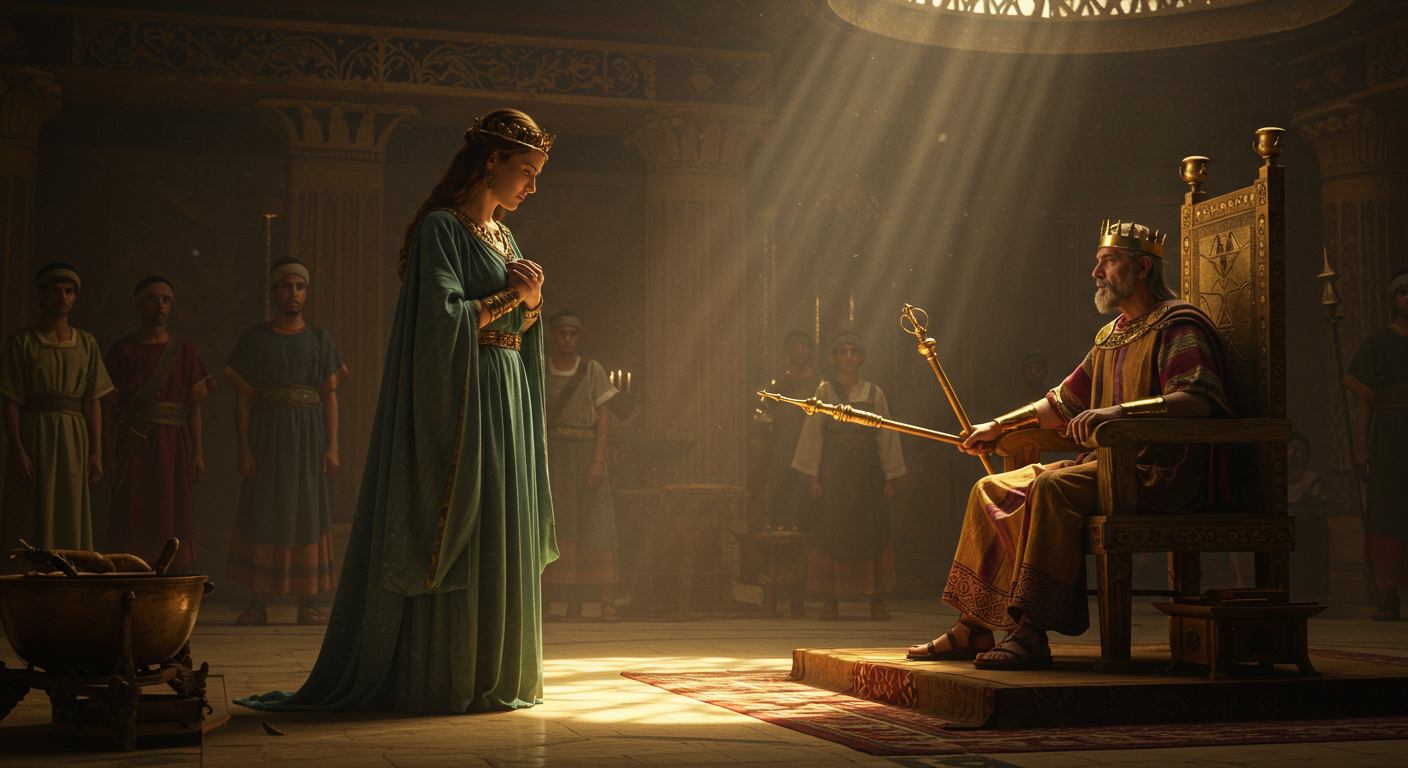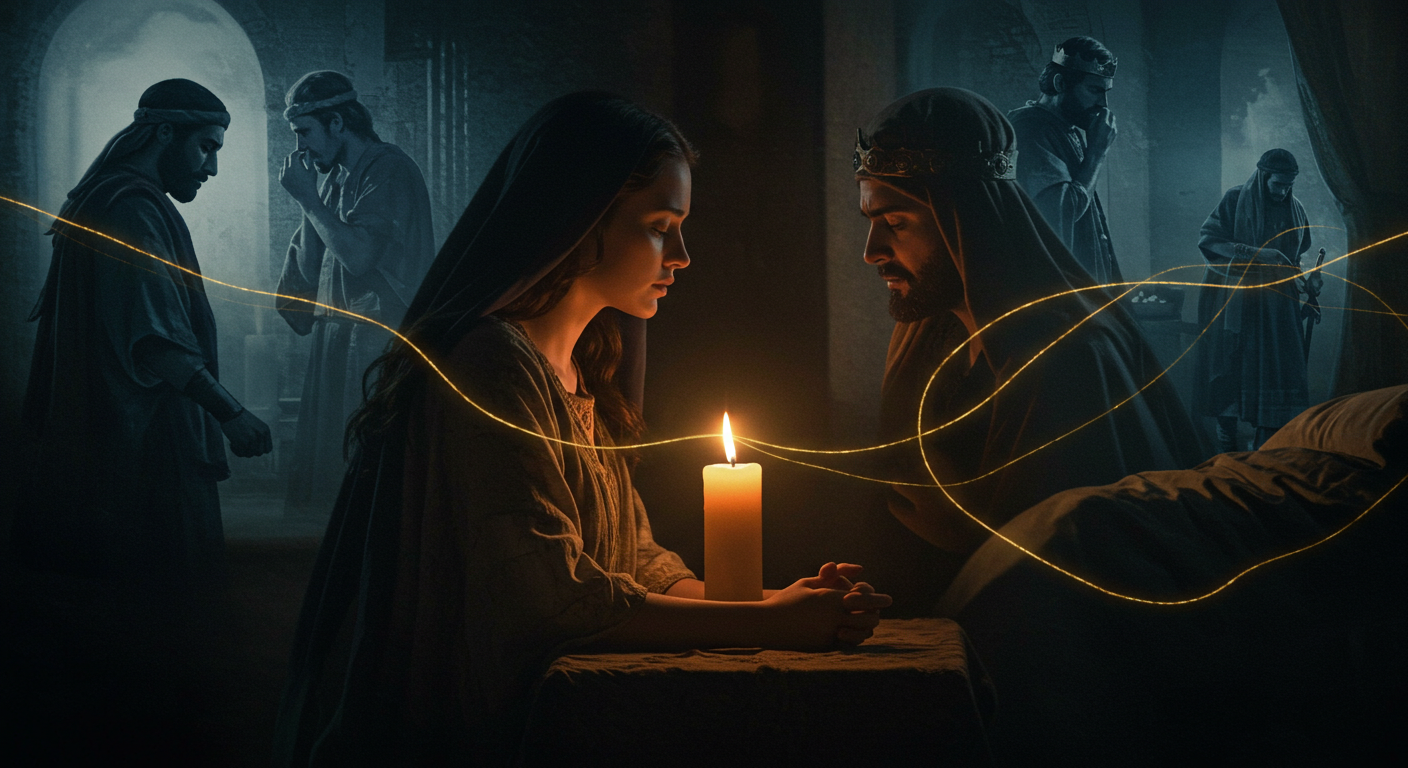Dive into the intricacies of divine orchestration in the Book of Esther, exploring God’s unseen influence in a story of courage, identity, and resilience.
Unveiling the Divine: Exploring God’s Hidden Hand in The Book of Esther
Introduction
Have you ever found yourself engulfed in a story that unfolds like a masterful symphony, where each note is subtly orchestrated yet deeply resonant? The Book of Esther is one such story. Unlike other biblical texts, it doesn’t overtly showcase divine intervention; God isn’t even explicitly mentioned. However, His presence permeates every twist and turn in the plot. This article is an exploration into the hidden hands of providence, unraveling God’s silent maneuvering in a tale of courage, identity, and survival.
📖 Key Verse or Passage
To truly grasp the finesse of divine orchestration, let’s consider Esther 4:14: “For if you remain silent at this time, relief and deliverance for the Jews will arise from another place, but you and your father’s family will perish. And who knows but that you have come to your royal position for such a time as this?”

Finding God in the Shadows
The Absence That Speaks Volumes
In a book where God’s name is a whisper hidden between the lines, how do we detect His influence? The very absence of God’s name in Esther beckons us to look deeper. This narrative absence invites you to reflect on times in your life where God operates quietly, nudging events and people even if the connection isn’t obvious. Esther’s tale mirrors those moments when the silence feels loud yet profound—a divine mystery urging us to trust beyond what is visible.
The Role of Chance and Choice
Esther’s world pivots on seemingly coincidental events. You’re left pondering, was it mere chance or a divine weave? Consider Esther’s selection as queen (Esther 2:17), a Jewish exile rising to royalty in a Persian empire. Her path wasn’t merely a series of lucky breaks; it was an interplay of choice and destiny. Mordecai’s advice to Esther—to recognize her royal role as pivotal for her people’s fate—is as relevant today. How often do you find yourself at crossroads, questioning whether you’re placed there for a purpose only hindsight will reveal?
Esther’s Courage: A Catalyst for Divine Action
Stepping Into the Unknown
Imagine being in Esther’s shoes—an orphaned Jewish girl thrust into opulence yet shackled by imminent danger. When Haman’s plot threatens the Jews, Esther’s initial reluctance to act echoes our own hesitations when faced with daunting tasks. Her eventual decision to approach the king unsummoned (Esther 4:16) wasn’t a mere act of bravery; it was a leap of faith. Here, you witness a pivotal moment when human courage becomes the hinge for divine intervention. It’s a reminder that your bold steps into the unknown can be catalysts for greater plans unfolding.
Collective Resilience in Prayer and Fasting
Esther’s story underscores the communal strength and spiritual fortitude in times of crisis. The Jewish people’s collective fasting and prayer (Esther 4:3) serve as powerful anchors, uniting them in hope and resistance. In your spiritual journey, this emphasizes the potency of shared faith and action. Even when God’s presence isn’t overt, these acts of devotion have the power to move unseen forces and alter paths.
Divine Justice: Poetic and Precise
The Rise and Fall of Haman
Haman’s rise to power and eventual downfall offer a striking illustration of divine justice. His edict to annihilate the Jews seems invincible until poetic justice intervenes. The very gallows Haman constructs for Mordecai becomes his own endpoint (Esther 7:10). This reversal is not just about morality; it’s a testament to unseen hands righting wrongs. Life, too, mirrors this ebb and flow, teaching us that while justice may be delayed, it isn’t denied.
Mordecai’s Elevation
At the same time Haman falls, Mordecai rises (Esther 10:3), underscoring that God’s hand sustains those who remain faithful. Mordecai’s journey from imminent execution to regal authority illustrates a transformation that feels both organic and divine. When reflecting on your life, consider how adversities might be setting the stage for future triumphs, orchestrated by a God whose justice flows like a river, steady and profound.

Conclusion
In conclusion, the Book of Esther invites you to recognize and appreciate the subtle ways God weaves His plans into the fabric of human actions and choices. It challenges you to see beyond the apparent, to trust that even in silence, divine orchestration is at work. Esther teaches that courage coupled with faith can change destinies and that justice, though unseen, is always at the ready—a divine promise wrapped in the silence of scripture.
🔍 Explore More Bible Insights:
✅ 1. Serving God by Serving Others
Tone: Practical, inspirational, servant-hearted
🔹 “Live Out Your Faith with These Reads”
✅ 2. The Prayer of Jabez – 1 Chronicles 4:10
Tone: Encouraging, bold faith, personal growth
🔹 “Ask Boldly, Live Fully – Keep Reading”
✅ 3. The Promise of Eternal Life – 1 John 2:25
Tone: Reassuring, hope-filled, theological
🔹 “Secure in Christ – Explore More”
✅ 4. Lessons from the Battle of Jericho – Joshua 6
Tone: Obedience, victory through faith, historical insight
🔹 “Victory Through Faith – Read Next”
As a ClickBank Affiliate, I earn from qualifying purchases.
Acknowledgment: All Bible verses referenced in this article were accessed via Bible Gateway (or Bible Hub).
“Want to explore more? Check out our latest post on Why Jesus? and discover the life-changing truth of the Gospel!”








